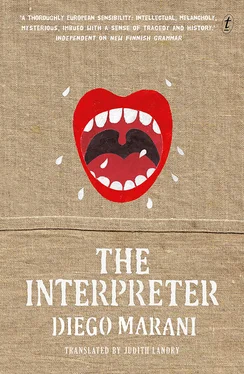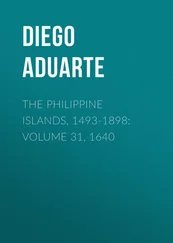‘So there you are! Did you hear it? I told you it existed! The primordial aquatic language once spoken by us all, and still concealed in each of our imperfect earthly tongues! The language of when we were fish, dark scaly inhabitants of the ocean’s depths, and God didn’t even know he had created us. I told you so! Well, I’ve discovered it! I speak it! I am the only man in the world who can talk to dolphins!’
I collapsed onto the wet tiles and wept furiously, as I had never wept before.
I’ve lived in the Tallinn aquarium for years now; it’s one of just sixteen in the world which have a dolphinarium, as do Constanta, Odessa and Klaipeda. I look after the dolphins. Kim, Kaina, Leda and Ferdinand are young striated dolphins originally from the Atlantic, and one of the more vocal species, together with the common dolphin. They are the only ones whose whistles can be heard on the surface, even if made deep under the water. Each morning I bring them four kilos of krill and, in the evening, live whitefish; in the spring I also give them herrings and freshwater crayfish which we get from the nearby canning factory. The symptoms produced by Dr Barnung’s lethal therapy are gradually abating, though every so often I still get my languages mixed up, particularly at a change of season. My attacks last for several hours, like a fever, causing me to utter sounds I can’t control, and at such times — because, for no reason, I feel ashamed of them — I go and take refuge in the aquarium. Although the line between madness and normality no longer seems so clear to me, I continue to feel that my animal whistling is somehow aberrant; at such moments the dolphins put their heads out of the pool and listen to me curiously; they point their snouts in the air and wave them around as though they were trying to smell something. Then they lay their heads on the dais and stare at me, as puzzled as I myself, and somehow disappointed. According to the interpreter, they cannot understand me; it seems that I speak the rare language of the southern Tursiops, which are shy and solitary, and live in the Sea of Japan and round the Kuril Islands.
Over time, reflecting on such little information as I managed to extract from my silent companion, I gleaned that Stauber and Barnung were in cahoots to rob him of his secret and boast of being the first to understand the primordial language of dolphins. What I had not known was that, in the past, Barnung had worked as an interpreter for the Soviet Politburo, under the name of Mirko Stolojan. I read as much in an old newspaper cutting I found when I was poking around among his possessions. He had then become the director of a psychiatric clinic in Nahodka, in the Sea of Japan; the photo showed him wearing the uniform of a medical officer, and a moustache. Apparently he’d been doing experiments with cetaceans, recording their whistling sounds and playing them round the clock in the patients’ rooms. People who were there at the time say that the most serious schizophrenics started imitating them. But then the clinic closed for lack of funds. Barnung fled to the West and took on a false identity. The whistling men began to wander all over Russia, instinctively looking for the sea, where they would be able to hear the dolphins’ call. Barnung continued his experiments in Munich — on patients in the linguistic clinic where I too ended up. He’d secretly incorporated the cetaceans’ whistles into the tapes with which he’d constantly bombard us; so, without realising it, we’d learned them. They bored into our minds, wormed themselves into us from within. What Barnung didn’t realise was that he was inoculating us with the rare language of the southern Tursiops, which is almost unknown in the ocean depths, and that may explain why his experiment failed. Like us, the various kinds of cetaceans have difficulty in understanding one other, and the ocean depths are peopled by creatures with no descendants, the last of a race that is dying but not yet extinct, and which cry out, unheeded, in their solitude. So I am even more alone: excluded even from the watery world into which I was unnaturally thrust, I speak a language which is a mental illness.
It was undoubtedly Barnung who murdered Stauber in Odessa, and hurled the unsuspecting Burke onto the tusk of the dead narwhal on the beach in Klaipeda. I too was on his list. He had not managed to rid himself of me with his therapies, so he had lured me onto the Toompea . But he himself had ended up drowned in his own pursuit of the narwhals.
So what had once struck me as a series of machinations now appears something else entirely. It would seem that chance alone brought me here: the ravings of a lunatic, whose path quite simply happened to cross my own, and nothing more; the experiments of a criminal neurologist, and the jealousy of a head of department for one of his subordinates had done the rest. It could have happened to anyone, and it happened to me — though it is undeniable that I was exposing myself to risk by mixing with insane deviants such as interpreters, people with slippery, unformed identities, in whose company sprinklings of the irrational are more likely to insinuate themselves and further crook humanity’s already crooked timber. Only among their like could a man be mad enough to want to talk with dolphins, confusing human with animal and imitating everything he hears and sees, from the rustling of leaves to the soughing of wind, from the glassy-eyed stare of a fish to the heat haze hanging over a desert. Even now that I see him every day, I can never remember what he looked like a moment ago, I cannot fix him in my memory. Each time I look at him, it’s as though I’m seeing something different: as different, indeed, as a landscape from a tree, or a stretch of sky, or one of his dolphins. He’s not a human being, he has no soul, no personality; he is a remnant, something left over from the cosmic slime when it was nothing and could have become anything. I alone among men have seen through him into the gulf from which the world emerged; I alone bear witness, and I cannot share my knowledge with any other living soul.
Today I am known as Tibor Preda, and this name — not my own — is the only one I can still bear. For I am the fruit of a mistake, a monstrous creature which should have died of the poisonous inoculations to which it was subjected. Yet I survived, and the man who engaged in such ruthless tinkering with fate seems to have cast me from his mind; abandoning his researches in midstream, he has condemned me to an existence lived out in a state of suspended animation, a victim of unremitting torment. But sometimes it occurs to me that there might be another, hidden meaning to this anguish, something I shall understand only with time. Perhaps the experiment for which I served as guinea pig is still under way, and this is just a phase, a stage in the metamorphosis I’m undergoing. I’m living in a bell jar, surrounded by particles of unknown substances which are splitting and cohering as in alchemy, able to transform all humanity into cetaceans over the course of a few generations.
At times I thought of going home, of ending my days in a psychiatric clinic, together with my secret. After all, time has passed, and perhaps no one now remembers the Beast of Bukovina. But I am bound to this man by a force which is irresistible; if I strayed from his side, I feel that I’d be lost, sucked into a maelstrom of pain, and utterly, unbearably alone. Still unsure when my time will come, I lack the courage to expose myself to further suffering. Here, at least the days slip by without incident, without my coming to any harm. So far, the vice which was destined to crush me has bitten in vain. I have learned Estonian, and I show parties of schoolchildren and tourists around the dolphinarium; I’ve been given a green uniform and a cap with a plastic peak with a label saying ‘Interpreter’. Although it was never my intention, I have become one of them; children regard me with awe, mothers give me tips. On Sundays I help the interpreter with the ‘singing’ sessions; I hand him the hoops through which he makes the dolphins jump, and the balls that they balance on their snouts. And when I hear their whistling, their lowing, those sounds which, once alarming, have now become so familiar to me; when I see them rising from the water beside their trainer, shaking their heads with that enigmatic smile of theirs, I wonder whether they too, like me, might not be slaves to this man, prisoners of his contagious madness.
Читать дальше












